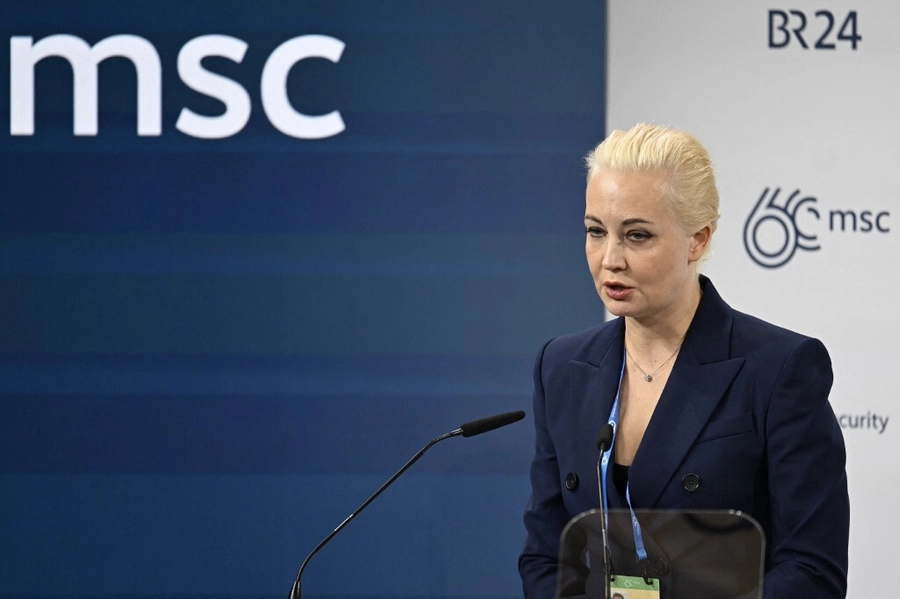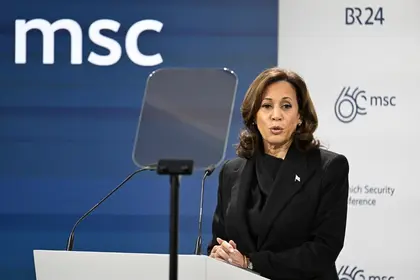The annual Munich Security Conference (MSC), which has entered its 60th year, opened on Friday, Feb. 16. Even though the focus of this year meeting has moved away Russia’s war in Ukraine to a much broader agenda on global polarization, Ukraine remains very much on the radar screen.
This was visible during the opening day largely thanks to the message from Kamala Harris, the US Vice-Present and the running mate of President Joe Biden.
JOIN US ON TELEGRAM
Follow our coverage of the war on the @Kyivpost_official.
Despite the apparent spring blossoms visible on the streets of the Bavarian capital, the mood on the first day of the MSC reflected the increasingly unstable, insecure and divided global order characterized by the organizers’ as zero-sum thinking (the title of this years’ MSC report is “Lose-Lose?”).
The news on the reported death of the Russian opposition leader Alexei Navalny, which emerged during the conference, added to the already gloomy picture.
In an emotional and very concise appeal on the MSC’s main stage, Navalny’s wife Yuliya threatened Putin and his cronies personally with paying the price for her husband’s death and for turning Russian into an authoritarian state. She also called on the international community to help Russia defeat Putin.


Sweden Reveals Drone Swarm Project Based on Lessons From Ukraine
Her appeal fell somewhat flat among the many Ukrainians in the audience who recognize the tremendous support for the Russian dictator amongst his own population and who were skeptical about Navalny’s position regarding Ukraine.
Despite the fact that Ukraine’s fight for survival was not as prominent on the agenda, this issue surfaced in numerous conversations and discussion on the main stage.
Harris appealed for continued military assistance to Ukraine, without any mention of the current gridlock in Washington. “President Joe Biden and I stand with Ukraine. We will work to secure critical weapons and resources that Ukraine needs. The failure to do so would be a gift to Putin,” said Harris.
Her address was filled with references to numerous achievements of the Biden Administration over the last four years in power - from substantial investments in domestic infrastructure to bringing the semiconductor industry back to the US to generate employment for ordinary Americans.
This clear emphasis placed on the fulfilled promises of the Biden Administration emphasized that the election year in the US is in full swing and every opportunity to capture the attention and imagination of the American electorate counts.
Harris’ speech also had strong notes of reassurance aimed at America’s NATO partners, especially in Europe. “NATO is central to our approach to global security. Our sacred commitment to the organization remains clear. It’s the greatest military alliance the world has ever known,” she stated.
This remark was much expected following a very different message delivered by the presidential candidate Donald Trump, who essentially encouraged Russia to attack those NATO countries that have not been fulfilling their financial commitments of 2% of GDP contributions to the Alliance, insinuating that as president he would permit this.
While Harris also highlighted the need for continued American leadership “in these unsettled times,” it was not clear whether she managed to convince America’s partners in Europe who remain jittery about the outcome of the US elections later this year.
Tomorrow brings another dynamic day at the MSC, with over 60 heads of state attending the event, including President Volodymyr Zelensky and Germany’s Chancellor Scholz. Today they signed a bilateral security deal in Berlin hailed as “historic” by the German leader.
You can also highlight the text and press Ctrl + Enter






